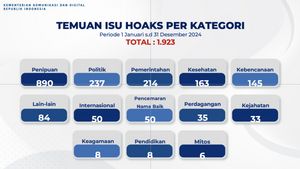JAKARTA - The war against the COVID-19 pandemic has not yet ended, but the potential for a new pandemic has emerged as a discussion. The media are busy talking about the G4 virus, a new strain of the H1N1 virus known as swine flu. This virus is said to be a potential pandemic in the future.
In 2009, swine flu emerged and was declared a global pandemic by WHO. The virus originating from pigs was first discovered in Mexico and later given the name H1N1. The symptoms of swine flu or H1N1 are the same as those of ordinary influenza. The body temperature is high around 38'C, accompanied by cough, sore throat, aches all over the body and joints. Some also experience nausea and diarrhea.
Based on data from the United States Centers for Disease Control and Prevention or CDC, the H1N1 virus is not like the seasonal flu virus. If the symptoms are mild, the patient can recover in a matter of days. However, this virus can also cause death if supported by other risk factors, such as obesity, the presence of a second infection from bacteria or having a congenital disease that can lower the immune system. This virus is also more prevalent in children and young adults. Those who are older are said to have developed immunity to it, perhaps because of its similarity to other flu viruses that have circulated before. This pandemic lasted throughout 2009 and occurred in 200 countries with a total death toll of more than 11,500 people.
From 2011 to 2018, researchers took 30 thousand pig nose swabs from slaughterhouses in 10 provinces in China. This is done to study the virus that causes swine flu. The results of his report are listed in the academic journal Proceedings of the National Academy of Sciences in the United States published on June 29, 2020 yesterday. From that study, they found 179 new swine flu viruses, with the G4 virus appearing most prominently since 2016. With the full name G4 EA H1N1, this strain is said to have all the key features of a virus to create a pandemic.
As of June 30, there have been 35 people who have tested positive for this virus. They are all in China of various ages. Although this virus has been confirmed to be transmitted from pigs to humans, and can grow and reproduce in the cells lining the human airways, the current condition is not classified as an emergency. There has been no evidence of human-to-human transmission, even though this virus has emerged since 5 years ago. This is also emphasized by a biologist from the University of Washington named Carl Bergstrom via his Twitter account.
So are we facing the start of a double pandemic, COVID + influenza? Not immanently. There's no evidence that G4 is circulating in humans, despite five years of extensive exposure. That's the key context to keep in mind.
- Carl T. Bergstrom (@CT_Bergstrom) June 29, 2020
Siniar VOI this time will discuss the potential for a pandemic from the new swine flu and the WHO and several related parties' statements regarding the current G4 or new swine flu virus. Hit the listen button and we'll tell the story for you.
The English, Chinese, Japanese, Arabic, and French versions are automatically generated by the AI. So there may still be inaccuracies in translating, please always see Indonesian as our main language. (system supported by DigitalSiber.id)













